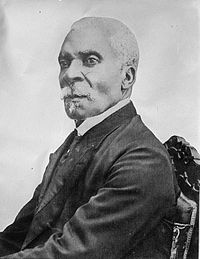François C. Antoine Simon
 From Wikipedia the free encyclopedia
From Wikipedia the free encyclopedia
Antoine Simon | |
|---|---|
 | |
| 18th President of Haiti | |
| In office December 6, 1908 – August 2, 1911 | |
| Preceded by | Pierre Nord Alexis |
| Succeeded by | Cincinnatus Leconte |
| Personal details | |
| Born | October 10, 1843 Les Cayes, Haiti |
| Died | March 10, 1923 (aged 79) Les Cayes, Haiti |
| Political party | Liberal Party |
| Spouse | Uranie Adélaïde Mentor |
| Profession | Military (divisional general) |
François C. Antoine Simon (a.k.a. Antoine Simon) (French pronunciation: [fʁɑ̃swa se ɑ̃twan simɔ̃]; October 10, 1843 – March 10, 1923) was President of Haiti from 6 December 1908 to 2 August 1911.[1] He led a rebellion against Pierre Nord Alexis and succeeded him as president.[2]
Biography[edit]
Francois C. Antoine Simon was born on 10 October 1843 in Les Cayes, Haiti, and died either on 10 January or 10 March 1923 in Les Cayes. He was originally from the town of Savane near Les Cayes and initially worked as a municipal police officer before joining the army as an officer.
In 1883 he was appointed commander of the troops in Sud, a post he held until 1908. During his military career, he was promoted to colonel in 1887. Between 1896 and 1902, He was aide-de-camp of the President Tirésias Simon Sam and was later promoted to general. It was as a general that he led a military revolt against President Pierre Nord Alexis.
Presidency 1908–1911[edit]
On 6 December 1908, he was appointed successor to President Alexis.[3][4] Although he had little formal education himself, he assembled an advisory group consisting of influential men. On 19 December 1908 he announced his six-member cabinet and took the oath of office before Senator Paulin.[5][6]
One of his first policy decisions was to pursue an appeasement policy allowing exiled Haitians to return. This set the stage for some stability during the early years of his mandate. President Simon strove constantly to improve agricultural production. He also had the intention of building a nationwide railway network. To accomplish this required several contracts with American companies, including the so-called "MacDonald Contract" – a contract to build a railway line between Port-au-Prince and Cap-Haïtien. Embedded in these negotiations was the cultivation and export of sugar and bananas by the Haitian American Sugar Company. However, these contracts were poorly prepared, leading to criticism from intellectuals and politicians alike. On the other hand, the contracts led directly to the paving of streets and electrification of Port-au-Prince. As a result of the modern roads, there was an increase in the presence of cars in Haiti.
To satisfy American banana plantations, Haitian companies were taxed, resulting in unrest by small landowners who ultimately paid the price. Small farmers in the north (Cacos) then began to revolt in June 1911. General Cincinnatus Leconte, a former Minister of Public Works and Agriculture under Simon Sam, took advantage of the situation to lead a coup d'état against Simon.
Leconte's initial campaign failed, but a subsequent attempt in August 1911 succeeded in the capture of Port-au-Prince. Simon was ousted from power by supporters of Leconte, who was his successor as President.[7] Simon went into exile[8] for several years, but returned to Haiti where he died in Les Cayes.
In Tell My Horse, Zora Neale Hurston recounts the elaborate Catholic funeral Simon gave to his pet goat Simalo upon the goat's death.[9]
Family[edit]
His ancestors are Pierre Baptiste Simon, Toussaint Louverture. One of President A. Simon’s daughter Anézulia Simon married Sergeant Lubencius Lubin whose children are: Antoine Lubin, Thérese Lubin, Darius Lubin, Alexandre Lubin, Damien Lubin, Claire Lubin; Ulysses Simon, and Celestina was a voodoo priestess, Antoine Simon Jeune (Antoinier) whose children with his wife Sanite Augustin are: Max, Alex, Amede, Cecile. A grandson named Charite Simon, and his great-grandchildren Romane Antoine Simon, James Simon, Sintilma Simon, Esther Simon, Sylvie Simon, Emmanuella Simon, Jean Marie Simon. He also had 2 great-great-grandsons named Marcel Simon and Sean Valere [citation needed]
References[edit]
- ^ John Carlos Rowe, Literary culture and U.S. imperialism: from the Revolution to World War II (Oxford University Press US, 2000), page 274)
- ^ "Alexis Flees To French Ship; Haitian President Deposed, Leaves His Capital, Wrapped In The Tricolor" New York Times 3 December 1908
- ^ "Hurry Election Of Simon In Haiti; Followers Fear Delay May Cause Disorders And Invite Intervention From United States" New York Times 8 December 1908
- ^ "Simon Elected President; Following Action by Haitian Congress, He Is Recognized By The United States", New York Times 18 December 1908
- ^ "Haitian Cabinet Formed; President Simon Announces The List Of His Official Advisers", New York Times 20 December 1908
- ^ "President Simon Takes Oath; New Haitian Executive Formally Inaugurated In Port-Au-Prince" New York Times 21 December 1908
- ^ "Rebels Near Haiti's Capital; But Simon Hopes To Quell Revolt Through Dispensions Of Enemies" New York Times 29 July 1911
- ^ "Haitian Rebels Win; Simon Now An Exile" New York Times 3 August 1911
- ^ "The Black Joan of Arc". www.nathanielturner.com. Archived from the original on 2005-10-25.
External links[edit]
- Biography in rulers.org
- Haitian Presidents
- Chapter XXIX, Haiti History Chapters, in: Haitiwebs.com
- Biography in Haitianmedia
- Fearon, James D./ Laitin, David D.: Haiti Archived 2013-10-02 at the Wayback Machine, Stanford University, 2006 (PDF-Datei; 259 kB)
- Decades Of Instability, 1843–1915, Library Of Congress, 1989
- World History: Haiti 1859–1915
